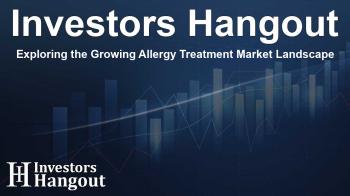Exploring the Growing Allergy Treatment Market Landscape

Understanding the Allergy Treatment Market Dynamics
The Allergy Treatment Industry, currently valued at USD 22.8 billion, is on the brink of substantial growth. Market forecasts suggest that by 2034, it could reach a staggering USD 42.7 billion, reflecting a robust compound annual growth rate (CAGR) of 7.2% from 2024 to 2034. This surge can be largely attributed to the increasing prevalence of allergies globally, especially in more developed nations, along with breakthroughs in treatment options such as allergy immunotherapy and advancements in biologics.
Drivers Behind Market Growth
There is a rising wave of allergic conditions that includes seasonal allergies, food allergies, and asthma. Awareness concerning the availability of enhanced treatment solutions is crucial in propelling demand. Health-conscious individuals are increasingly opting for medications such as antihistamines, corticosteroids, and various forms of allergy immunotherapy. A shift towards personalized healthcare is creating exciting new opportunities in targeted therapies, driving additional interest in the market.
The Role of Research and Development
Intensive research and development activities are forming the backbone of innovation in the allergy treatment space. Many companies are channeling significant investment into clinical trials aimed at developing novel treatment modalities, which encompass biologics and allergy vaccines. Increased partnerships between pharmaceutical firms and healthcare practitioners are also enhancing accessibility to state-of-the-art allergy treatments in both metropolitan and rural regions.
Key Factors Influencing Demand for Allergy Treatments
Several key drivers are fueling the demand in the allergy treatment market, including rising environmental pollution levels, increased allergy incidence, and evolving lifestyle patterns that contribute to allergic reactions. Furthermore, greater healthcare spending is improving infrastructure, which supports better allergy treatment accessibility. Government initiatives geared toward health system enhancements also play a vital role in advancing market dynamics.
Regional Market Analysis
In terms of growth potential, North America appears to be on track for impressive revenue increases in the coming years. This is attributed to the region's advanced healthcare framework and the correlation between rising environmental issues and the uptick in immunotherapy usage for allergy treatments. Simultaneously, the Asian market is experiencing rapid expansion due to a gradual increase in disposable income and growing awareness of innovative immunotherapy options.
Market Opportunities and Segment Insights
The allergy treatment market presents substantial opportunities, particularly emphasized through advancements in personalized treatment strategies. With the growing trend toward precision medicine, customized allergy treatments tailored to individual patient profiles could foster market growth, particularly in biologics and specialized allergy vaccines.
Technological Innovations
Technological advances, especially the rise of digital health solutions like symptom monitoring apps and telemedicine consultations, are set to amplify patient engagement and enhance treatment delivery effectiveness. Expanding healthcare access, particularly in emerging markets, remains a crucial factor in the growth of the allergy treatment sector.
Competitive Landscape and Strategic Direction
The allergy treatment market is characterized by fierce competition among diverse participants, including global pharmaceutical leaders, biotechnology innovators, and regional enterprises. To secure their market positions, these entities are continuously focusing on product innovation, extensive portfolios, competitive pricing strategies, and strategic geographic expansions. As advancements in treatment solutions evolve, this competition is positioned to intensify, subsequently enhancing market growth.
Strategic Partnerships
Notable firms like Sanofi, AstraZeneca, and Regeneron are prioritizing biologic development targeting specific immune system pathways, employing precision medicine methodologies to deliver highly tailored treatments for chronic allergic conditions. Collaborations and mergers within the sector are increasingly becoming central to driving product innovation and optimizing research and development efforts.
Frequently Asked Questions
What is the current value of the Allergy Treatment Industry?
The Allergy Treatment Industry is currently valued at USD 22.8 billion as of 2024.
How fast is the Allergy Treatment market expected to grow?
The market is expected to grow at a CAGR of 7.2% from 2024 to 2034, reaching USD 42.7 billion by the end of the forecast period.
What are the primary drivers of market growth?
Primary drivers include rising allergies globally, advancements in treatment technologies, and increased awareness among patients about available options.
Which regions are driving market demand?
North America and the Asia-Pacific region are leading in market growth, fueled by developed healthcare infrastructures and increased allergy prevalence, respectively.
What opportunities exist for improving allergy treatments?
There are significant opportunities in personalized medicine, technological advancements in digital health, and enhanced access to healthcare services, particularly in emerging economies.
About Investors Hangout
Investors Hangout is a leading online stock forum for financial discussion and learning, offering a wide range of free tools and resources. It draws in traders of all levels, who exchange market knowledge, investigate trading tactics, and keep an eye on industry developments in real time. Featuring financial articles, stock message boards, quotes, charts, company profiles, and live news updates. Through cooperative learning and a wealth of informational resources, it helps users from novices creating their first portfolios to experts honing their techniques. Join Investors Hangout today: https://investorshangout.com/
Disclaimer: The content of this article is solely for general informational purposes only; it does not represent legal, financial, or investment advice. Investors Hangout does not offer financial advice; the author is not a licensed financial advisor. Consult a qualified advisor before making any financial or investment decisions based on this article. The author's interpretation of publicly available data shapes the opinions presented here; as a result, they should not be taken as advice to purchase, sell, or hold any securities mentioned or any other investments. The author does not guarantee the accuracy, completeness, or timeliness of any material, providing it "as is." Information and market conditions may change; past performance is not indicative of future outcomes. If any of the material offered here is inaccurate, please contact us for corrections.
